Medical expert of the article
New publications
Preparations
Sore throat sprays
Last reviewed: 03.07.2025

All iLive content is medically reviewed or fact checked to ensure as much factual accuracy as possible.
We have strict sourcing guidelines and only link to reputable media sites, academic research institutions and, whenever possible, medically peer reviewed studies. Note that the numbers in parentheses ([1], [2], etc.) are clickable links to these studies.
If you feel that any of our content is inaccurate, out-of-date, or otherwise questionable, please select it and press Ctrl + Enter.
Sore throat is the most common painful symptom. Let's consider effective sprays for its elimination, indications for use, medicinal action, dosage.
With the arrival of cold weather, many people begin to complain of sore throats. And this is not surprising, since it is enough to breathe in frosty air, and a cold is guaranteed. Feeling a sore throat, burning and itching, most immediately go to the pharmacy for medications - tablets, lozenges, mixtures, powders for brewing. Despite the variety of dosage forms, sprays are especially popular. With their help, you can completely treat a sore throat, which is much more effective than other means.
The main types of aerosols for sore throat:
- Antiseptic
Such preparations are suitable for treating diseases caused by microbes. They destroy the infection on the mucous surface. As a rule, they have a combined composition, some components complement and enhance the effect of others.
- Anti-inflammatory
Reduce the inflammatory process, reduce the activity of pathogenic viruses and bacteria. Some medications reduce the production of inflammatory mediators, minimizing painful sensations.
- Cleansing and moisturizing
Such medicines not only eliminate painful sensations, but are also excellent hygiene products. For example, a throat spray based on sea water and herbal extracts reduces irritation and pain, protects the mucous membrane from dryness. Medicines help with the first signs of a cold, pharyngitis, laryngitis, tonsillitis.
- Symptomatic
They eliminate sore throats, irritation, burning and itching, and help you fall asleep faster. They are used in the treatment of many diseases that involve damage to the upper respiratory tract.
An aerosol is a bottle with a medicine that is under pressure. By pressing the lever, the medicine is sprayed onto the mucous membrane, which allows you to completely treat the inflamed throat. The spray creates a high concentration of active substances in the tonsil area, which has a positive effect on therapy. Only a small concentration of the medicine enters the systemic bloodstream, so such products have a minimum of contraindications. Irrigation of the throat is rightfully considered the most effective local procedure in the treatment of infectious lesions of the upper respiratory tract.
Read also:
Indications for use
Sore throats occur with various viral and bacterial infections. The malaise can be caused by fungal or mixed flora. But in all cases, the upper respiratory tract is affected. If the disease is accompanied by inflammation of the mucous membrane, then burning, itching and tickling appear. The pathological process can affect the tonsils, taking on a purulent character. Various drugs are used for treatment, but aerosols deserve special attention.
Indications for use:
- Colds and acute respiratory viral infections.
- Pharyngitis.
- Laryngitis.
- Tonsillitis.
- Angina.
- Adenoiditis.
- Exacerbation of chronic infections.
By irrigating the throat, unpleasant symptoms can be eliminated more quickly than by sucking tablets or using mixtures. The advantage of such preparations is that, thanks to spraying, they create the maximum concentration of the active substance in the inflammation site. They eliminate inflammatory and infectious diseases, both in the early and chronic stages.
Most often, throat medications have a combined composition, so they have a complex effect on the body. The composition of the aerosol can be represented by the following substances:
- Antibiotics (sulfonamides) – used to treat chronic infections. Prescribed for sore throat and tonsil damage. Bioparox and Ingalipt sprays deserve special attention.
- Antiseptics (phenol, chlorhexidine and others) are included in many preparations and have a destructive effect on harmful microorganisms. Popular products in this category: Lugol, Hexoral.
- Painkillers (lidocaine, benzocaine) are indispensable for severe sore throats that occur with tonsillitis and pharyngitis. Of the medications with lidocaine, the spray TeraFlu is highly effective.
- Cleansing – they contain sea water, it moisturizes the mucous membrane and accelerates its healing. They have no contraindications and do not cause side effects. This category includes: Aqualor, Aqua Maris.
Any spray has both symptomatic and auxiliary effects. Such drugs are used regardless of the stage or severity of the disease, since their main effect is to alleviate the patient's well-being. Only a doctor can determine which medicine is right for you.
Pharmacodynamics and pharmacokinetics
The effectiveness of a drug can be determined using its pharmacodynamics. Let's consider the mechanism of action of a spray for a sore throat with Lugol's solution. The aerosol is an antiseptic iodine-containing drug with the active substance - molecular iodine.
It has a bactericidal effect on fungi, gram-positive and gram-negative flora. When applied to damaged surfaces, it has a resorptive and proteolytic effect, affects metabolism.
Since throat sprays are topical agents, special attention should be paid to their pharmacokinetics. Let's consider this using iodine-containing drugs as an example. Iodine resorption through damaged mucous membranes and tissues is insignificant. When interacting with the mucous membrane, about 30% of the substance is transformed into iodides.
If iodine gets inside, it is quickly absorbed, penetrating into organs and tissues. It can accumulate in the thyroid gland. Most of it is excreted by the kidneys in the form of urine, as well as with sweat and feces. The active component penetrates into milk and through the placental barrier, so it is not recommended during pregnancy and breastfeeding.
Names of sore throat sprays
The use of aerosols for the treatment of upper respiratory tract diseases is becoming increasingly popular. This is due to the fact that hoarseness, irritation, burning and other pathological symptoms cause a lot of inconvenience. Knowing the names of sprays for sore throat, you can choose the most effective medication.
Since discomfort can be caused by various infectious, viral and bacterial pathogens, when choosing a medicine, special attention should be paid to its mechanism of action. Many drugs have a complex effect, combining pain-relieving, softening, moisturizing, anti-inflammatory and antimicrobial effects.
Popular drugs:
- To reduce pain and irritation: Faringosept, Kameton, Tantum Verde, Hexoral, Thera Flu Lar.
- To moisturize the throat when it is dry and sore: Kamfomen, Ingalipt, sprays with propolis, Sporangin.
- For severe inflammation of the mucous membrane and lymph nodes: Vitaon, Lugol, Chlorophyllipt (oil solution), Peach oil.
- Antiviral and antiseptic sprays: Bioparox, Strepsils, Ingalipt, Chlorophyllipt.
- Universal drugs active against viral and bacterial pathogens: Angilex, Hexoral, Orasept.
By spraying onto the inflamed mucous membrane, the medicine reaches directly into the affected area, accelerating the healing process.
Miramistin
A broad-spectrum antiseptic. Miramistin is used to treat viral, fungal and bacterial infections.
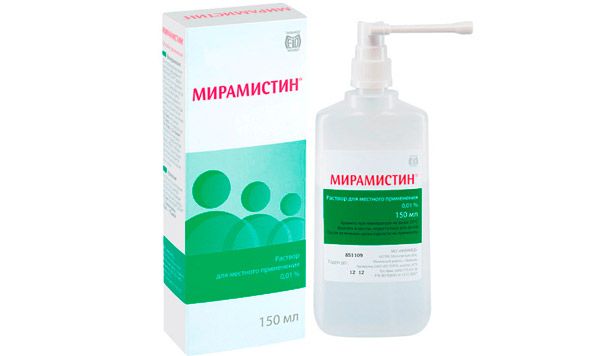
Effective in the treatment of patients of all ages. Highly sensitive to its action are: gram-positive and gram-negative microorganisms, fungi and protozoa. Active against streptococci and staphylococci
- Indications for use: fungal and inflammatory lesions of the mucous membranes and skin, burns, purulent wounds, sinusitis, laryngitis, tonsillitis, otitis, stomatitis. Used for irrigation of the nose and throat, both for therapeutic and prophylactic purposes. Spray the mucous membrane of the pharynx 4-5 times a day, pressing the sprayer 3-4 times.
- In case of individual intolerance to the components of the drug and in case of overdose, side effects appear. Most often, this is a reaction of heat at the site of application, which passes in 10-20 seconds. If this symptom appears, discontinuation of the drug is not required.
- Miramistin is prescribed for pediatric patients, during pregnancy and lactation. But only according to medical indications. When interacting with antibiotics, a decrease in the resistance of microorganisms to the drugs used is observed.
Hexoral
An antimicrobial agent with analgesic, antiseptic, deodorizing and enveloping action. Hexoral contains an active component - hexetidine, which is active against gram-positive and gram-negative microorganisms, fungi. The substance destroys the cells of microorganisms, suppressing their metabolism and oxidative reactions.
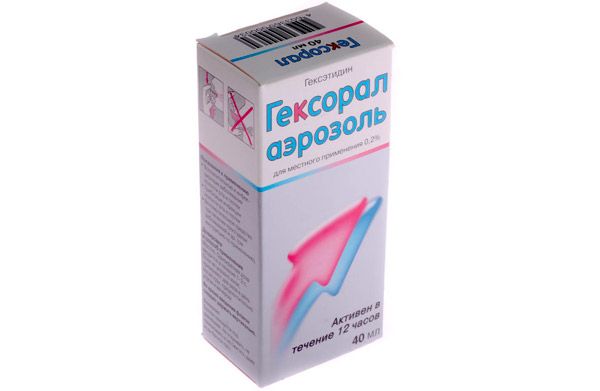
Available as a solution and aerosol in 40 ml cans. The therapeutic effect occurs immediately after use and lasts for 10-12 hours.
- It is prescribed for the treatment of inflammatory lesions of the oral cavity and larynx: pharyngitis, sore throat, tonsillitis, gingivitis, glossitis, periodontosis. The solution is used for bleeding gums, fungal lesions of the oral cavity and larynx. It is effective as a preventive and auxiliary agent for acute respiratory viral infections, laryngeal injuries. It can be used as a hygienic and deodorizing agent.
- The duration of therapy and dosage depend on the indications for use. The spray should be sprayed on the affected areas for 2-3 seconds 2 times a day, after meals. The solution is used undiluted for gargling and washing the affected mucous membrane and skin.
- Geksoral is contraindicated in case of hypersensitivity to its components and for children under three years of age. Side effects are manifested in the form of skin allergic reactions and taste disturbances. Use during pregnancy is possible only on medical indications. In case of overdose, nausea, vomiting, gastrointestinal disorders appear. Gastric lavage and symptomatic therapy are recommended for treatment.
Cameton
A medicinal product from a group of drugs used for respiratory diseases. Kameton is an antiseptic with essential oils that have pronounced therapeutic properties. Contains eucalyptus oil, menthol, racemic camphor, tetrafluoroethane and other substances.
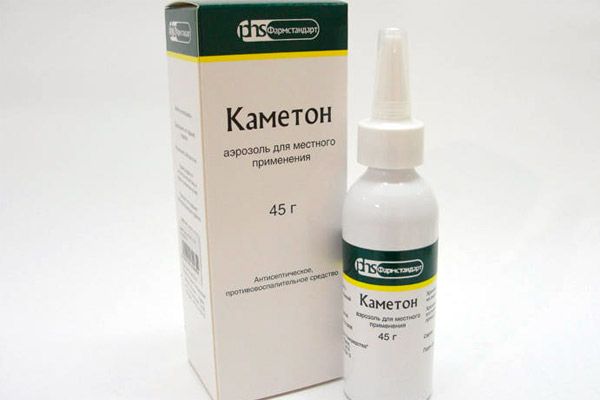
It is produced in the form of a spray for local application. When applied to the mucous membrane, it has an anti-inflammatory, antiseptic, vasoconstrictive and local anesthetic effect. It relieves swelling and normalizes breathing.
- Kameton is prescribed for the treatment of pharyngitis, rhinitis, laryngitis, tonsillitis. It is recommended to use it in the acute and chronic stages of inflammatory processes. It moisturizes mucous membranes and normalizes breathing, relieves pain, and has an antimicrobial effect.
- The method of application and dosage depend on the doctor's recommendations. Adult patients are prescribed 2-3 sprays into the throat 3-4 times a day, and for children 1-2 sprays. On average, the course of treatment takes 7 days, if necessary, it is extended to 14 days, but not more. To avoid the spread of infection, each bottle is intended for individual use.
- Contraindicated for use in case of individual intolerance to the components and for patients under 5 years of age. The aerosol should be used after meals, after rinsing the mouth with clean water. If there are burns with necrotic plaque in the oral cavity, the plaque should be removed with a sterile swab.
- Side effects are rare, but may manifest themselves as the following symptoms: skin allergic reactions, shortness of breath, dry nose and throat, swelling of the tongue and throat, and irritation. Signs of overdose are expressed as increased side effects. The drug is not recommended during pregnancy and lactation.
 [ 8 ]
[ 8 ]
Tantum Verde
Oral spray with the active ingredient benzydamine hydrochloride. Tantum Verde is a non-steroidal anti-inflammatory drug with anti-exudative and analgesic action. It relieves painful symptoms in the throat and oral cavity. In dentistry, it is used as a local anesthetic.
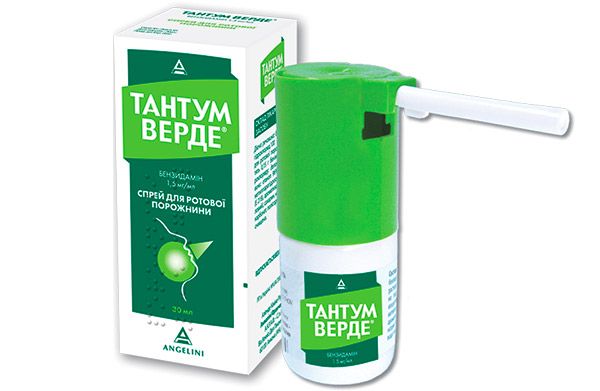
After spraying onto the mucous membrane, benzydamine is absorbed and exerts a pharmacological effect. It is excreted in the urine as conjugated compounds and inactive metabolites.
- It is used for symptomatic therapy of inflammations and irritations of the oropharynx, to eliminate painful sensations that occur with pharyngitis and gingivitis. In dentistry, it is used after tooth extraction or for preventive purposes.
- The dosage and duration of treatment depend on individual indications. Adults are prescribed 4-8 sprays 2-5 times a day, children aged 6-12 years - 4 sprays and patients aged 4-6 years - 1 spray for every 4 kg of body weight.
- Tantum Verde is contraindicated in case of hypersensitivity to its components, as well as intolerance to NSAIDs and acetylsalicylic acid. It is not recommended to use during pregnancy and lactation. Since to date there is no reliable information on the safety of its use during this period.
- Local application of benzydamine does not cause overdose symptoms. However, if the substance is ingested, negative reactions are possible. Most often, these are nausea and vomiting, increased sweating, tremors, agitation, and convulsions. To eliminate this condition, it is recommended to restore the water-electrolyte balance and conduct symptomatic therapy.
- Side effects may occur in many organs and systems. As a rule, these are disorders of the gastrointestinal tract, anaphylactic and allergic reactions, headaches and dizziness, bronchospasms. If these symptoms appear, you should seek medical help to adjust the dose.
Ingalipt
A combined antimicrobial agent based on essential oils. Ingalipt is used to treat colds. Its active components: sulfanilamide, thymol, eucalyptus and mint oil, have antimicrobial, antifungal, anti-inflammatory and analgesic effects.
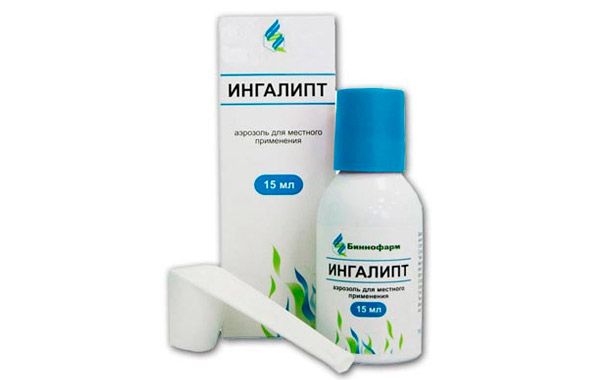
The medicine is available in the form of a spray for irrigating the throat and mouth.
- Indications for use: tonsillitis, laryngitis, sore throat, flu, ulcerative and aphthous stomatitis, relief of sore throat during colds. The aerosol is sprayed on the affected areas of the mucous membrane for 1-2 seconds 3-4 times a day. Before using it, rinse your mouth with boiled water or soda solution.
- Contraindicated in case of hypersensitivity to essential oils and sulfonamides. Not prescribed for patients under three years of age due to the risk of laryngeal spasm during irrigation.
- Side effects manifest as allergic reactions, short-term burning and sore throat. Attacks of nausea and vomiting, allergic rashes on the skin, itching, redness are possible. To eliminate the above symptoms, it is recommended to reduce the dosage and consult a doctor.
Bioparox
A pharmacological agent for the treatment of inflammatory diseases of the respiratory tract, lung and bronchial lesions. Bioparox is an inhalation drug for local use. Its active ingredient is fusafungine, an antibiotic (polypeptide).
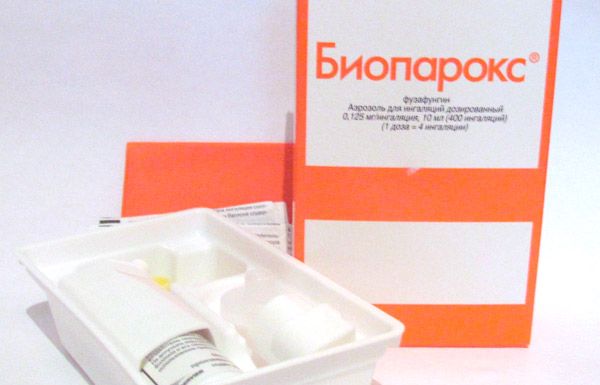
It has a bacteriostatic effect on a wide range of microorganisms, including gram-negative and gram-positive bacteria, fungi. Bacteriostatic and fungistatic action is based on the destruction of the cell membrane of the virus.
- After irrigation of the affected areas, the active substance is not absorbed into the systemic bloodstream. The maximum concentration in the blood plasma does not exceed 1 ng / ml and lasts for three hours. It is excreted with respiratory secretions. The drug is released in the form of an aerosol for local use in aluminum cans of 20 ml. Each bottle is designed for 400 doses.
- Indications for use: acute inflammatory diseases of the upper respiratory tract and ENT organs, including infectious ones. The aerosol is effective in the treatment of rhinitis, sinusitis, pharyngitis, tonsillitis, laryngitis, bronchitis, tracheitis. Can be used as a preventive measure after tonsillectomy and infectious diseases.
- It is used for inhalation through the mouth and nose. The bottle must be activated by pressing its base a couple of times. For therapeutic purposes, 3-4 irrigations are done per day, for prevention 2-3. The duration of treatment should not exceed 7 days.
- Main contraindications: hypersensitivity to the components, patient age under three years. With special caution, prescribe to patients with a tendency to allergic reactions. Bioparox is not recommended during pregnancy and lactation, as there are potential risks to the fetus.
- It is well tolerated, but some patients experience side effects. As a rule, these are gastrointestinal disorders, changes in taste, lacrimation, laryngospasm, cough, dryness and burning in the throat, allergic reactions. To eliminate side effects, you must contact your doctor and stop using the drug.
 [ 9 ]
[ 9 ]
Orasept
An antiseptic drug with analgesic properties. Oracept is available as an oral spray.
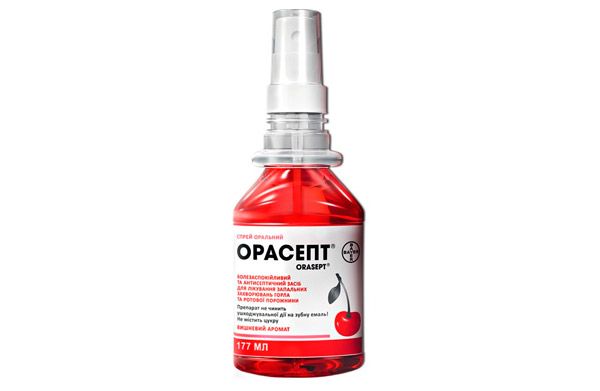
The active ingredient is phenol, which has a fungicidal and antimicrobial effect. The composition also includes glycerin, which softens the throat mucosa and eliminates irritation. The active component does not penetrate the bloodstream, there is no systemic absorption.
- The medicine is used as an analgesic and antiseptic for the treatment and prevention of ENT diseases (tonsillitis, pharyngitis, tonsillitis). When used in dental practice, it eliminates stomatitis, gingivitis and periodontitis. It can be used as an antiseptic in dental surgeries.
- The dosage depends on the doctor's prescription. For adults and adolescents - 3-5 sprays every 2-4 hours, for children aged 2-12 years - 3 sprays every 3-4 hours. The duration of therapy should not exceed 5 days. If the patient's condition has not improved after treatment, it is necessary to adjust the regimen and conduct repeated diagnostics.
- Contraindicated in case of hypersensitivity to active substances. With special caution it is prescribed for children under 2 years old, taking into account potential risks and expected benefits. Allowed for pregnant women and during breastfeeding, if the benefits to the mother are higher than the potential risks to the fetus.
- It is well tolerated, so side effects and overdose are rare. In isolated cases, swelling and hyperemia of the mucous membrane of the throat and oral cavity, allergic reactions are possible. High doses cause nausea and vomiting. In case of overdose, it is recommended to wash the stomach and seek medical help.
Throat Sprays with Iodine
One of the most powerful antiseptics is iodine. The substance has fungicidal, tanning and cauterizing properties. It is used to treat wounds, protects them from rotting and infection, and fights fungi. In combination with other substances, it has an anti-inflammatory, antiseptic effect.
Let's look at effective sprays for sore throat with iodine:
Lugol's spray
An indispensable medicine for throat diseases. The aerosol has the same properties as a regular solution, but is much simpler and more convenient to use. The active substance is iodine, which turns into iodides after getting on the mucous membrane.
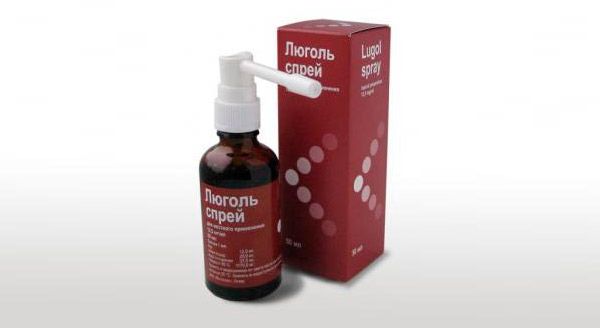
Contains calcium iodide, glycerol and water. Has an antiseptic and wound-healing effect, is effective in treating fungus. Since iodine has an irritating effect, glycerol is used to soften it.
- It is prescribed for wounds and injuries as an external remedy, as well as for rhinitis, purulent otitis, stomatitis, trophic ulcers, infected burns. High therapeutic effect is observed in acute and chronic tonsillitis.
- The medication is contraindicated for patients with thyroid disease and hypersensitivity to iodine. It is not prescribed for infants, as irrigation of the throat can cause laryngospasm. Use during pregnancy is possible only on doctor's prescription. Lugol spray is not recommended for a common cold with a runny nose and sore throat. Since its irritating effect will only increase discomfort.
- The dosage depends on the severity of the painful sensations. As a rule, the sore larynx is irrigated 2-6 times a day. After the first application, the pain and discomfort go away. It is extremely important not to allow the medicine to get into the eyes. If this happens, they must be washed with clean water or a solution of sodium trisulfate.
Yox
Antiseptic for throat irrigation with active ingredients - povidone-iodine and allantoin. The combined agent has a bactericidal and immunostimulating effect. Due to the increased secretion of mucus, a mucolytic effect occurs.
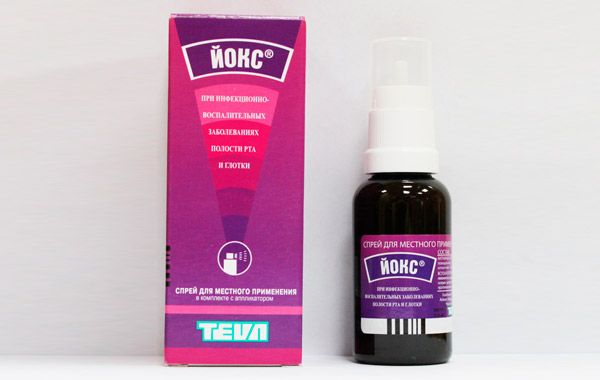
It has an antimicrobial effect, penetrates the epithelium of the mucous membranes and respiratory tract, stopping the inflammatory process. Suppresses the growth of bacteria, moisturizes the mucous membrane, relieves irritation and accelerates the regeneration of damaged cells.
- Yox is quickly absorbed through damaged mucous membranes or skin. When it enters the body, it is metabolized to iodides and accumulates in the thyroid gland. It is excreted by the kidneys in the form of urine, as well as with feces, saliva and sweat. The active components penetrate the hematoplacental barrier and are excreted with milk.
- Prescribed for the treatment of all forms and stages of tonsillitis, inflammatory processes on the mucous membrane of the oral cavity and throat, as well as at the first symptoms of flu. As a rule, the spray is used 2-4 times a day every 4 hours. After irrigation, it is not recommended to drink liquid for 30-40 minutes.
- It is well tolerated, but in rare cases side effects are possible. Most often these are allergic reactions, a feeling of heat and burning at the site of application, dry mucous membranes. Long-term therapy can lead to the development of iodism (metallic taste in the mouth, swelling of the larynx and eyelids, increased salivation). To eliminate the above symptoms, it is necessary to stop treatment and seek medical help.
- Overdose with local application is impossible, but when the drug is swallowed, signs of acute poisoning appear. Patients complain of nausea and vomiting, stomach pain, diarrhea, metallic taste in the mouth. For 3 days after swallowing iodine, swelling of the throat persists, which can cause asphyxia, aspiration pneumonia or swelling of the lungs. In rare cases, circulatory disorders are observed. Symptomatic therapy is indicated to eliminate the overdose.
- Contraindicated in case of individual intolerance to iodine, pregnancy and lactation, hyperthyroidism, renal and cardiac insufficiency and for patients under 6 years of age. It is not recommended to use simultaneously with other local antiseptics.
Lugs
An antiseptic from the pharmacological group of halides, oxidizers and aldehydes. Lugs is produced in the form of a spray for irrigation of damaged mucous membranes and tissues.
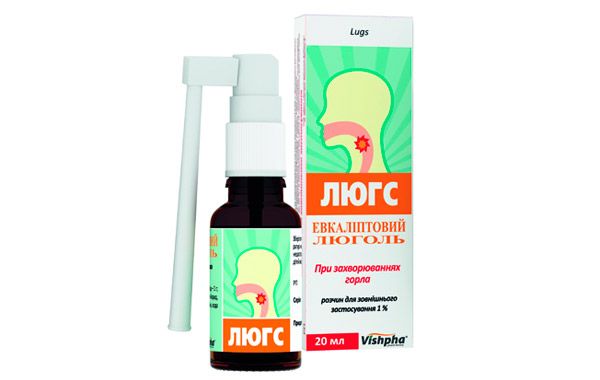
Active ingredients: iodine, eucalyptus tincture, iodide K, glycerin. Has an antimicrobial effect, is active against gram-negative and gram-positive microorganisms, E. coli and fungi.
- Indications for use: catarrhal, follicular and lacunar tonsillitis, stomatitis, tonsillitis and pharyngitis in acute or chronic form. The aerosol is used 1-2 times a day, spraying on the mucous membrane of the sore throat. The duration of therapy depends on the stage of the pathological process.
- Main side effects: skin allergic reactions, metallic taste in the mouth, swelling of the throat and lungs, gastrointestinal disorders. The drug is contraindicated for patients with individual intolerance to its components, during pregnancy and breastfeeding, with renal and cardiac insufficiency.
- Overdose symptoms appear when the drug is swallowed. In this case, epigastric pain, diarrhea, nausea and vomiting, metallic taste in the mouth appear. Since there is no specific antidote, the stomach is washed to improve the condition. It is also recommended to take sorbents or milk. The drug is incompatible with other aerosols, essential oils and ammonia-based medications.
Chinese throat sprays
A sore throat is an unpleasant symptom that has been fought for many years. Various means are used for treatment, which differ in their effectiveness and pharmacological composition. Chinese throat sprays deserve special attention. The drugs are made from herbal ingredients, so they have a minimum of contraindications and side effects.
- Funjiao Spray with Propolis
An antiviral agent that destroys pathogenic microorganisms and prevents their reproduction.
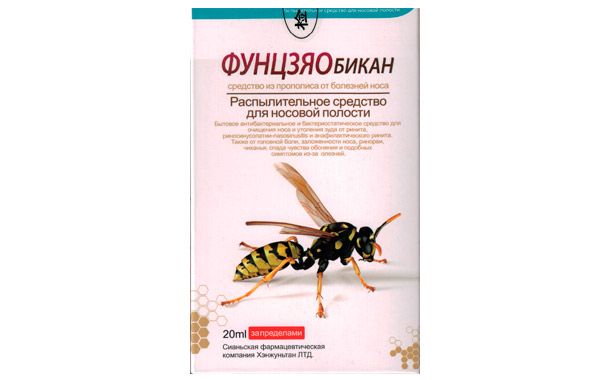
Eliminates unpleasant sensations in the throat and bad breath. It contains: Japanese honeysuckle, licorice, field mint, propolis, domifen. The spray is used 1-2 times a day. Funjiao is contraindicated in case of individual intolerance to its components.
- "Bee Propolis" throat spray with propolis
The aerosol is effective in the treatment of gingivitis, pharyngolaryngitis, and has a therapeutic effect on tongue ulcers and other damage to the oral cavity.
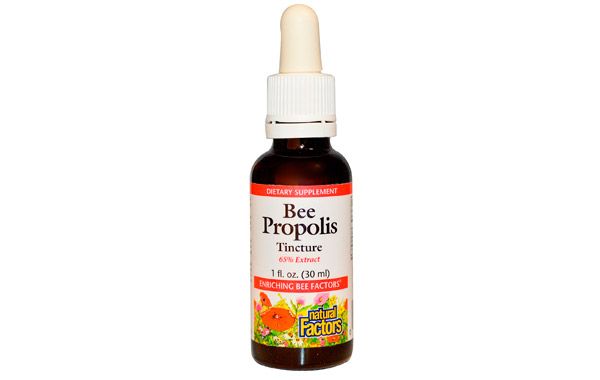
It contains the following substances: propolis, Japanese honeysuckle, tea polyphenols, and peppermint essential oil. Chinese throat spray destroys microbes in the oral cavity and freshens breath. To achieve a lasting therapeutic effect, 1-2 sprays are administered 2-3 times a day. Do not use if you are allergic to bee products.
 [ 10 ]
[ 10 ]
Antibiotic Sore Throat Sprays
A worthy alternative to systemic drugs are sprays for sore throat with antibiotics. They have a local effect, increasing the effectiveness of treatment and reducing the degree of pathological impact on the body.
When choosing a spray for a sore throat with an antibiotic, you should pay special attention to the following drugs:
- Anginal
An antiseptic with anti-inflammatory, expectorant, analgesic and enveloping action. Anginal consists of herbal antibiotics, which provide a complex effect on the mucous membrane: reduce pain, stop the inflammatory process, relieve irritation and hoarseness.
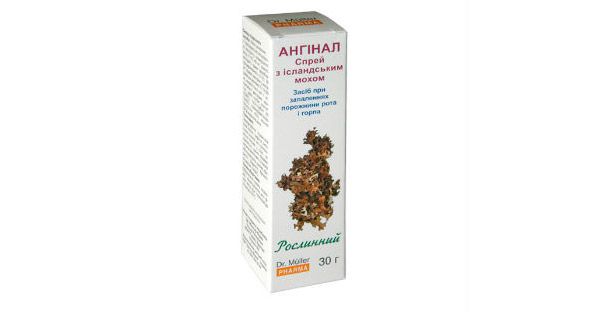
It contains chamomile, mallow flowers, sage and eucalyptus leaves. All herbs have a pronounced anti-inflammatory and antiseptic effect.
- Prescribed for the treatment and prevention of infectious and inflammatory diseases of the upper respiratory tract, throat and oral cavity. Effective for tonsillitis, laryngitis, pharyngitis, bronchitis, stomatitis, gingivitis.
- The herbal spray is sprayed onto the damaged mucous membranes. One spray is 0.132 g of the drug. For patients aged 3-6 years, 1 dose is prescribed 2-3 times a day, for children aged 6-12 years, 1-2 doses 3-5 times a day, for children over 12 years and adults, 2-3 doses 5-8 times a day. To achieve the maximum therapeutic effect, it is not recommended to eat or drink for 30-40 minutes after taking the drug.
- The product is contraindicated for use in case of hypersensitivity to its components, for children under 3 years of age and bronchial asthma. Overdose symptoms and side effects are rare, but may manifest as allergic reactions at the spray site. Anginal is prescribed for the treatment of the throat during pregnancy and lactation.
- Octenisept
Antiseptic spray for external use. Active ingredients - phenoxyethanol and octenidine dihydrochloride, destroy cells of sensitive microorganisms. The medicine is active against gram-positive and gram-negative microorganisms, fungi, viruses and bacteria.
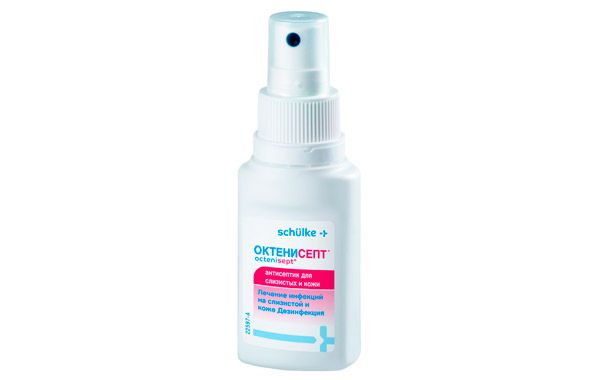
Exhibits virostatic, bactericidal and fungicidal activity.
- After spraying on the mucous membrane, it is not absorbed into the systemic bloodstream and does not have a toxic effect. If the aerosol is applied to tissues with wounds or burns, then an acceleration of the healing process is observed due to the immunostimulating effect. The therapeutic effect develops 30-60 seconds after application and lasts for a long period of time.
- Prescribed for injuries, burns and other damage to the mucous membrane and skin. Effective in the treatment of ENT diseases, infectious and inflammatory lesions of the oral cavity and nasopharynx. Can be used to disinfect the surgical field during surgical or diagnostic manipulations. Allowed during pregnancy and lactation.
- The spray is intended for local use. Before using it, rinse your mouth and throat with clean water. The recommended course of treatment is 7-10 days, 2-3 times a day. In case of overdose, side effects occur. Most often, this is a change in taste sensations and a bitter taste in the mouth. Minor burning, irritation and dryness in the throat are possible.
- Theraflu LAR
A local anesthetic, antimicrobial agent used in the treatment of ENT diseases and dentistry. Teraflu LAR contains benzoxonium chloride, which has a pronounced antibacterial effect on harmful microorganisms.
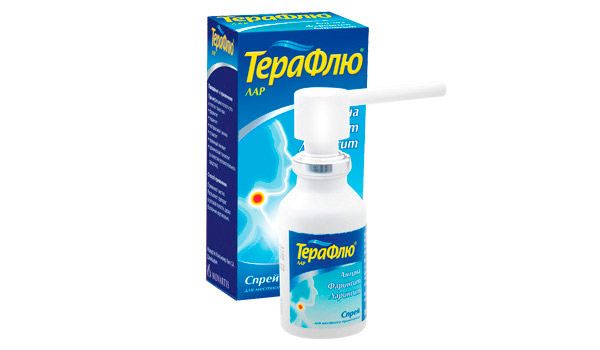
Active against gram-positive and gram-negative microorganisms, viruses, fungi. Another component of the aerosol is lidocaine. The substance is a local anesthetic, reduces pain in the throat, facilitates swallowing and breathing.
- After spraying on the mucous membrane, benzoxonium chloride is not absorbed and does not accumulate in tissues, it is excreted in urine. Lidocaine is absorbed through the mucous membrane, its bioavailability is 35%. It is metabolized in the liver, excreted in urine.
- It is intended for the treatment of infectious and inflammatory diseases of the pharynx and oral cavity: pharyngitis, tonsillitis, gingivitis, laryngitis, tonsillitis, stomatitis. Adult patients are prescribed 4 sprays 3-6 times a day, for children from 4 years old - 2-3 sprays 3-6 times a day. Duration of treatment is 5-7 days. If during this period there is no relief of painful symptoms, then you should consult a doctor.
- Teraflu is contraindicated in case of hypersensitivity to its active components and intolerance to ammonia compounds. It is not used during pregnancy and lactation, for patients under 4 years of age. In case of overdose, allergic reactions, dryness and sore throat are possible. Such symptoms do not require discontinuation of the drug.
Propolis based throat sprays
An effective and safest natural antibiotic is propolis. The substance destroys pathogenic microorganisms and has no chemical components, making the treatment as safe as possible. Compared to synthetic components, it does not destroy the microflora of the digestive tract. Contains microelements, vitamins, biostimulants, accelerates the regeneration of damaged tissues. The beekeeping product can be safely combined with other drugs.
Let's look at popular throat sprays based on propolis:
- Aerosol "First aid with propolis"
Contains highly concentrated extracts and phytoextracts. Active ingredients: propolis, calendula, chamomile, calamus root. Such a rich composition has a strong antiseptic and anti-inflammatory effect. Accelerates the healing of ulcers and wounds, reduces inflammation, has an antibacterial, antifungal and antiviral effect. Eliminates sore throat and pain.
Indications for use: colds, pharyngitis, sore throat, laryngitis, tonsillitis, glossitis, gingivitis, stomatitis, periodontitis. Before use, rinse your mouth with warm water and spray a couple of times. After that, you can't eat for 30 minutes. The course of therapy is 10-14 days.
- Propolis Spray
The medicine has a wide range of action. It helps in the treatment of acute and chronic tonsillitis, pharyngitis, stomatitis, gingivitis. The product is sprayed on the affected areas of the throat 3-4 times a day. The duration of treatment should not exceed 10 days. Contraindicated for use in case of hypersensitivity to bee products.
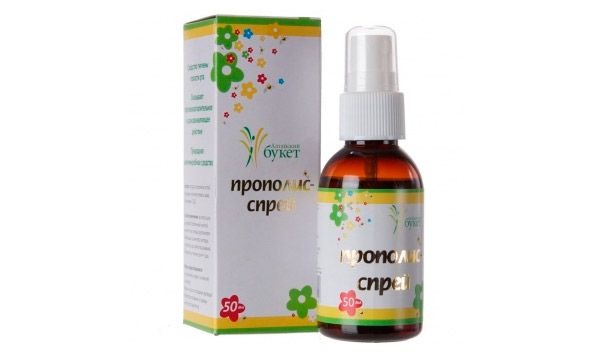
A pharmacological agent from the category of biogenic stimulants. It has anti-inflammatory and antimicrobial effects. It contains the following substances: propolis, ethyl alcohol and glycerin. Proposol has a wound-healing, fungicidal and bactericidal effect on the body, improves the immune status.
Main indications for use: tonsillitis, glossitis, stomatitis, catarrhal gingivitis. The drug is effective in the treatment and prevention of inflammatory diseases of otolaryngology and dentistry. The aerosol is sprayed into the oral cavity, 1-2 sprays 2-3 times a day. Duration of treatment is 5-7 days. Contraindicated for use in case of hypersensitivity to bee products. The drug is well tolerated, so it can be used by pregnant women. Side effects are rare and manifest as allergic reactions.
How to use throat sprays
Sprays are used for spraying on the inflamed mucous membranes of the larynx. This allows achieving the maximum therapeutic effect, since the active components get directly into the local lesions. To get a prolonged therapeutic effect, you need to know how to use sprays for sore throat.
- Before irrigation, it is necessary to rinse the mouth and throat with warm water. This will remove food debris, mucus or pus from the damaged mucous membrane, opening access to the active components.
- Before the procedure, shake the can of medicine well and press it 1-2 times to get the medicine into the sprayer.
- The nozzle should be inserted into the mouth and pressed 2-3 times, directing the spray in different directions. It is very important to hold your breath so that the medicine does not get into the respiratory tract and digestive tract.
- After spraying, it is not recommended to swallow saliva for 3-5 minutes and to refrain from drinking or eating for 30-40 minutes.
During treatment, only one spray can be used, since using several topical preparations at the same time will cause side effects.
Using Sore Throat Sprays During Pregnancy
Treatment of upper respiratory tract diseases in expectant mothers requires careful selection of medications. The use of sprays for sore throat during pregnancy is possible only on doctor's prescription. This is due to the fact that many medications penetrate the placental barrier, having a pathological effect on the fetus.
Doctors advise choosing herbal sprays. These can be medicines with propolis or sea water, as they moisturize the inflamed mucous membrane and destroy pathogens. Most often, women are prescribed Stopangin or Tantum Verde spray, they are allowed in the second and third trimesters and during breastfeeding. Iodine-based drugs are contraindicated.
Throat Sprays While Breastfeeding
The use of drugs during lactation has a number of limitations. This is due to the fact that the active components of the drug can enter the child's body with breast milk and cause a number of negative consequences. The most common painful symptom encountered during lactation is a sore throat. It can be caused by a cold or more serious diseases of the larynx.
A throat spray during breastfeeding should be selected by the attending physician after diagnosing the woman's condition. Let's consider the safest and most effective means:
- Miramistin is a broad-spectrum antiseptic. It is approved for nursing mothers and can be used to irrigate not only the throat, but also the nasal passages.
- Ingalipt is a local drug with antimicrobial, antifungal and bactericidal properties. Before using it, rinse your throat and mouth with warm water.
- Geksoral is an antiseptic aerosol with antimicrobial activity. Effective in the treatment of colds of varying severity.
Contraindications for use
Any medicine has certain contraindications for use. As a rule, a spray for a sore throat is not prescribed for children under 3 years old. The aerosol has an irritating effect and can provoke laryngospasms. Another contraindication that applies to all drugs is individual intolerance to the active components. If there were allergic reactions in the anamnesis to at least one component, then the spray is not prescribed.
Local remedies are not used for obstructive processes in the bronchi. They are prescribed with special caution for pregnant women and during breastfeeding. Another obstacle to the use of drugs for throat irrigation is atrophic pharyngitis. Patients are not prescribed drugs that dry out the mucous membrane; preference is given to herbal medicines.
Side effects
Failure to comply with the rules for using the medication provokes adverse symptoms that arise from many organs and systems. Side effects of sprays for sore throat most often manifest as local allergic reactions. Patients complain of burning and dryness of the throat mucosa. In particularly severe cases, the larynx swells, causing breathing difficulties and attacks of asphyxia.
Aerosols are used to irrigate damaged surfaces, i.e. the drug is not intended to be swallowed. If the drug is ingested, it may cause various degrees of severity of disorders of the gastrointestinal tract, cardiovascular and hematopoietic systems. To eliminate side effects, it is necessary to seek medical help and conduct symptomatic therapy.
Overdose
Long-term use of throat sprays provokes adverse symptoms. Overdose is possible with frequent use of the product, that is, when exceeding the dose prescribed by the doctor. In this case, allergic reactions occur: itching, burning, dryness and irritation in the throat, swelling of the respiratory tract and even asthma attacks.
Overdose may cause cardiovascular, digestive and hematopoietic system disorders. Symptomatic therapy is used to treat side effects, sorbents are taken and the stomach is washed. After the condition has normalized, you should seek medical help to select another remedy and adjust the treatment.
Interactions with other drugs
The simultaneous use of several sprays for sore throat is contraindicated. This is explained by the fact that drugs of different composition and effectiveness cause side effects. Interaction with other drugs - tablets, mixtures, injections, rubbing, is possible with the appropriate doctor's prescription.
If pain in the upper respiratory tract is caused by a cold, viral, bacterial or infectious disease, the patient is prescribed complex therapy, which consists of drugs in different forms of release. Such treatment allows achieving a stable therapeutic effect in a short time.
Storage conditions and shelf life
In order for the medicine to have its full therapeutic effect, it is necessary to observe the storage conditions. Aerosols for the throat are released in special cans in which the medicine is under pressure, which ensures its spraying. Vials with the drug should be kept away from open fire, avoid mechanical damage to the packaging.
The medicine is stored at room temperature, protected from direct sunlight and out of reach of small children. Compliance with the storage conditions of the medicine allows it to be used throughout its entire shelf life.
When buying and storing any medicine for a long time, you need to pay attention to its expiration date. It is indicated on the packaging or directly on the spray can. Expired aerosols cause side effects, which negatively affects overall well-being.
The shelf life is affected by compliance with storage conditions. If they have been violated, it is better not to use such a medicine. Most throat sprays are sold over the counter, but before buying and using them, you should consult a doctor.
Effective sprays for sore throat
Success in treating any disease largely depends on the drugs used. The effectiveness of medications is determined by how active they are against the pathogen. That is, there is no universal spray for sore throat, but there are several recommendations for choosing one:
- In case of bacterial infection, preparations with antiseptics, antibiotics or sulfonamides are necessary. But do not forget that some microorganisms become insensitive to aerosol on the 2-3 day of use. Therefore, in the absence of a therapeutic effect, a remedy with a different active substance should be selected.
- If the pain is caused by chronic diseases of the larynx and pharynx, then moisturizing, enveloping and softening preparations that do not contain irritating components are suitable for treatment.
- To combat viral diseases, it is better to choose sprays with anesthetic and anti-inflammatory effects.
Let's look at effective sprays for sore throat:
- Bioparox is an antibiotic with fusafungine. It is effective in eliminating fungal infections and coccal flora. It has anti-inflammatory properties. It has a minimum of side effects and contraindications, so it is allowed in the 2nd and 3rd trimesters of pregnancy. Long-term use or exceeding the prescribed dosage causes dryness and sore throat. It cannot be used on a regular basis, since after 1-2 courses, microbes develop resistance.
- Geksoral is an antiseptic with the active component hexetidine. It has antifungal and anti-inflammatory properties. It is effective in the treatment of any inflammatory lesions of the oropharynx, as well as fungal infections, injuries to the oral mucosa or gums. It has a minimum of contraindications, the course of therapy should not exceed 5-6 days.
- Stopangin is a broad-spectrum drug. Suitable for both adults and children. It has antifungal, antiseptic, enveloping and analgesic effects. It is used for any diseases of the upper respiratory tract.
- Proposol is a spray with propolis. It has an antimicrobial and anti-inflammatory effect. It moisturizes and envelops the affected mucous membrane. The medicine has proven itself not only in ENT practice, but also in dentistry in the treatment of inflammation of the palate, tongue, gums. Contraindicated for patients under 12 years of age.
- Tantum Verde is very often prescribed for the treatment of oropharyngeal diseases in children. It contains benzydamine hydrochloride (NSAID), which is active against viral, infectious and inflammatory lesions. The main contraindication is intolerance to the active substances, possible side effects are local allergic reactions.
- Yox is a povidone-iodine-based drug. It has a broad spectrum of action, has antimicrobial and anti-inflammatory effects. It is used to treat tonsillitis, pharyngitis, laryngitis, stomatitis and other diseases of the oropharynx. Contraindicated for children under 8 years of age, during pregnancy and breastfeeding.
A throat spray is an easy-to-use and effective remedy that allows you to minimize discomfort and pain in a short time. In order for the aerosol to have not only a symptomatic effect, but also to eliminate the cause of the disease, a doctor should select the medicine.
Attention!
To simplify the perception of information, this instruction for use of the drug "Sore throat sprays" translated and presented in a special form on the basis of the official instructions for medical use of the drug. Before use read the annotation that came directly to medicines.
Description provided for informational purposes and is not a guide to self-healing. The need for this drug, the purpose of the treatment regimen, methods and dose of the drug is determined solely by the attending physician. Self-medication is dangerous for your health.

